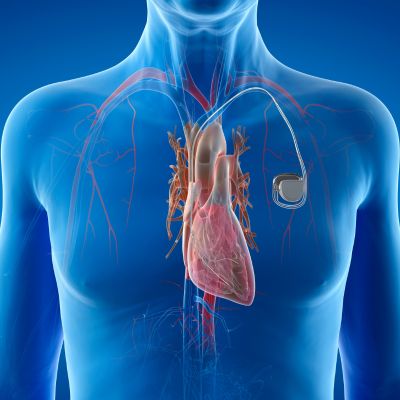Subcutaneous Implantable Cardioverter Defibrillator (S-ICD)
If you’re at risk for sudden cardiac arrest, your Cardiologist may recommend an implantable cardioverter defibrillator (ICD) to help protect your heart. A subcutaneous ICD (S-ICD) is a type of ICD that’s placed beneath the skin of your chest, rather than inside your heart.
Once the device is in place, it constantly monitors your heart rhythm, and if it detects an abnormal rhythm, it delivers an electrical shock to restore normal rhythm and prevent sudden cardiac arrest.
Benefits

- Less invasive: The S-ICD doesn’t require leads to be placed inside the heart, reducing the risk of complications and infection.
- Improved quality of life: The S-ICD can help protect your heart and reduce the fear of sudden cardiac arrest, allowing you to participate in activities that you enjoy with greater peace of mind.
- High success rate: S-ICDs have proved to be effective in preventing sudden cardiac arrest.
Is an S-ICD Right for You?
At KIMS Hospital, we offer advanced S-ICD placement procedures with the latest technology, making it easier for patients to lead normal lives with minimal disruptions. The first step is to have an initial consultation with a Consultant Cardiologist who can assess your medical history and explain to you the appropriate treatment options. This appointment can be at KIMS Hospital or Sevenoaks Medical Centre.
The above are guide prices only.
Consultants
Frequently Asked Questions
Why choose a Subcutaneous Implantable Cardioverter Defibrillator (S-ICD)?
The subcutaneous implantable cardioverter defibrillator (S-ICD) device has two main benefits over currently used devices. Firstly, as there are no leads actually placed into the heart, their removal or replacement is much simpler, therefore reducing the potential risk for infection.
The S-ICD may also have a better capacity than other ICDs to discriminate between normal and abnormal heart rhythms and it is anticipated that patients with this device will receive fewer unnecessary shocks.
How does the procedure work?
During the S-ICD procedure, your consultant will make a small incision under your arm, creating a pocket in which the device will be placed. The S-ICD system includes a pulse generator and a lead, which runs under the skin from the device to the sternum. This lead is placed close to the heart, but not inside it, which may reduce the risk of complications associated with traditional ICDs.
How does a subcutaneous ICD work?
The subcutaneous ICD senses cardiac signals, but the lead is not directly attached to the heart. Also, unlike a conventional transvenous ICD, the subcutaneous device is not designed to provide long-term pacing. The implantation procedure is carried out with the patient under general anaesthesia, or with local anaesthesia and sedation.
Do subcutaneous and transvenous ICDs improve physical and mental quality of life?
Both patients with subcutaneous ICDs and patients with transvenous ICDs experienced statistically significant improvements in physical and mental quality of life between implantation and 3-month follow-up (p<0.0001) and 6-month follow-up (p<0.0001). However, the difference between 3- and 6-month follow-up was not statistically significant.
When might I need an S-ICD?
If you have had, or are at greater risk of having, an abnormally fast heart rhythm. This could result in you experiencing symptoms such as palpitations, dizziness or in serious cases, a cardiac arrest (heart attack).
An S-ICD will continuously monitor the heart rhythm and deliver therapy to correct the arrhythmia as required.
- Make a general enquiry
- Appointment enquiry
Our team are on hand to help answer any queries you might have about coming to visit us. You can use the form below and one of our team will be in touch. Alternatively to speak to a member of our friendly team, please call 01622 237 500.
Enquiry hours are Mon-Thurs 8am-8pm, Fri 8am-6pm and Saturday 8am-4pm.
If you would like to book an appointment, you can use the form below and one of our team will be in touch.
Alternatively to speak to a member of our friendly team, please call 01622 237 500.
Enquiry hours are Mon-Thurs 8am-8pm, Fri 8am-6pm and Saturday 8am-4pm.
Please be aware, if you are requesting a diagnostic scan such as an MRI, or CT, you must have a referral from a relevant clinician or Allied Health professional such as a physiotherapist.